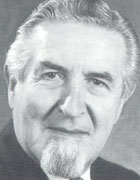How do you describe your job when you meet people at a party?
Unfortunately my job can’t be explained by saying “I’m a teacher.” I get eyes drooping and a lack of understanding. People understand what a research scientist or professional is but not an operational scientist. I tell people I’m an operational scientist in the water industry with a responsibility for looking a the treatment of waste water to make it fit for drinking purposes, or looking at the treatment of waste water to minimize an adverse impact on the environment. I investigate any risk factors that relate to drinking water or the environmental quality of water and how it affects the public.
Describe briefly how your career has progressed to date.
My career has taken me into the application and management of operational science in the water industry to facilitate the support of public health and the investigation of problems of water contamination. This involved assessing the subsequent impact on the confidence of the public on how effectively adverse situations were managed. I was formerly Chief Scientist of South West Water, and I’m currently a consultant in water science and risk management.
How well is your job compensated? What is the starting salary for your field, and how much can this be expected to rise?
Graduates would be expected to earn £18K/year. The mechanism is there for you to gain experience: going out sampling, collecting from a wide multiplicity of sources, and looking and the biological and botanical sides. It’s important for people to realize the ladder is quite wide at the bottom, and like a pyramid, narrow at top, where people could expect to receive salaries of six figures proportions. The top requires people to be highly motivated and put in a lot of effort.
How do you see your field developing over the next 5-10 years?
Whenever there’s a major crisis, the question will always be asked “do we have an adequate supply of water that’s suitable for drinking?” and “How is waste water going to affect drinking resources?” These questions are the major building block for public health in all civilized countries….without these things we are lost.
What’s the most unexpected thing about your job?
My relationship with the public. I have a huge interface with the public and with professional and non-professional organizations. Another unexpected thing is the impact of the work itself. How simple things like collecting sample are of fundamental importance. These are elementary thing but they have huge implications.

